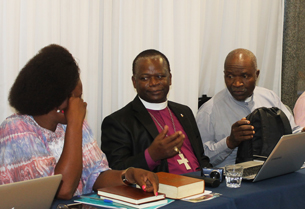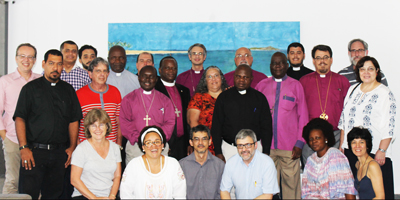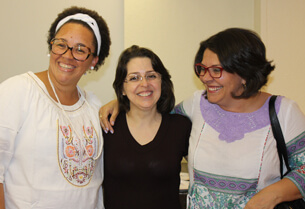On the morning of 27 February 2015, after a session of prayer and devotion on the beaches of Recife, the Lusophone delegates gathered in small groups to discuss priority themes in further detail.
Group themes were focused on women’s ministry, youth, theological education, and diaconia and development. In the feedback session groups reported inspiring conversations and visionary plans for taking the Lusophone network forwards.
The women’s group discussed how they would continue to share and exchange resources and learning with each other. Women’s meetings, such as the Mothers’ Union Provincial Meeting in October this year, would be used as key opportunities for networking and sharing, as would meetings specific to Portuguese-speaking countries.
Reporting back in the plenary session, Revd Lilian Lira said, “We are excited about this opportunity to strengthen solidarity among women and build on the sisterhood of the Anglican Communion. We have already discussed how we will share the booklet from SADD (Service for Diaconia and Development in Brazil), on ending gender-based violence, with the other Lusophone churches, and ask others likewise to share their materials with us. We are looking forward to how this will build the capacity of churches worldwide and share Lusophone experiences and resources with the wider Communion.”
Reporting back from the group focused on youth, Revd Jordan Santos said, “Some churches represented here are working to reorganise their youth structures, and so this is a pivotal time for a network of sharing and discussion to be introduced. As a result of our discussions we have decided to coordinate a Lusophone Youth Network, which will create a communication platform for youth in Lusophone dioceses across the Anglican Communion.”
 The Lusophone Youth Network will aim to share resources for young people, involve young people in outreach and social work, connect young people to other areas of the church to widen understanding, and connect youth ministries to diaconia and development in every diocese. In addition the underlying values of spirituality, prayer, solidarity and commitment to the Five Marks of Mission will be supported, with the aim that young people would understand what it is to be a part of the worldwide Anglican Communion, in connection with other dioceses and with a unique Anglican identity.
The Lusophone Youth Network will aim to share resources for young people, involve young people in outreach and social work, connect young people to other areas of the church to widen understanding, and connect youth ministries to diaconia and development in every diocese. In addition the underlying values of spirituality, prayer, solidarity and commitment to the Five Marks of Mission will be supported, with the aim that young people would understand what it is to be a part of the worldwide Anglican Communion, in connection with other dioceses and with a unique Anglican identity.
In diaconia and development, Sandra Andrade represented the group and spoke about the need to share and support one another’s work. As a result of their discussions the group are looking towards a ‘Mission and Diaconia’ seminar, where Lusophone representatives will gather to think about the definition of diaconia and the links between this and mission; that space for the mission of the church grows when social action is embedded in church life.
The group noted that whilst this seminar was just a visionary idea at the moment, they hoped it would soon become a reality with support and collaboration from Lusophone churches and their partners worldwide. They are hoping to further discuss expectations, challenges and desires for diaconia and development, and develop a project of collective action in which the hopes and relationships of the Lusophone network would be shared with their wider communities.
Archbishop Francisco da Silva closed the session with a note of congratulations and excitement at the plans that had been put forward:
“It is exciting that we are not only speaking the same language – Portuguese – but that we are truly speaking the same language. Despite our geographical, cultural and social difference we are coming from the same place in our hearts. We are building very strong foundations, which I believe will lead to an important movement. We have so much consensus already in what we are discussing; we are dreaming the same dreams. All that is to come is to think together about how we can make these dreams a reality.”
Paulo Ueti, Regional Facilitator for the Anglican Alliance, said, “It has been wonderful to see these representatives of the Lusophone Anglican Community come together, and we are all looking forward to sharing more and seeing how we build on these foundations. There is a lot of energy in the room and many ideas for further collaboration that have already been proposed – it will be interesting to see what is to come and the next steps for the Lusophone delegates.”

Pictures
Top: Lilian Lira with representatives of SADD, from Brazil
Middle: Joana Chilengue, Carlos Simeao Matsinhe and Jossias Solomone from Limbombos, Mozambique
Bottom: Lusophone delegates in Recife, Brazil

